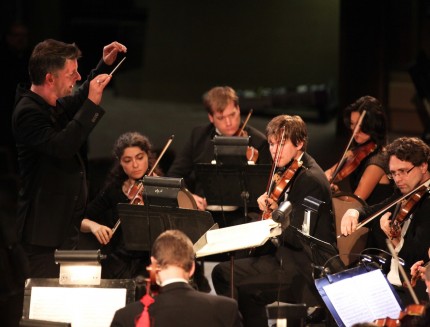Beethoven Festival closes with apt revolutionary fervor

The Beethoven Festival closed Sunday with all due revolutionary fervor, offering the Eroica Symphony and a Chicago premiere.
There’s not much of Beethoven’s oeuvre that has not been heard at some point in Chicago. Sunday afternoon’s closing event gave us the complete Creatures of Prometheus, in what festival director George Lepauw claims is the ballet’s belated Chicago premiere, 211 years after the first performance in Vienna.
As with the opening concert, the final event took place in the main first-floor Great Hall of the former People’s Church in Uptown, drawing what appeared to be the largest crowd of the nine-day festival. The imposing three-story space with a wooden interior makes for bright and in-your-face attacks from a full orchestra.
Even with the musicians pushed as far back as possible, the 16 dancers didn’t have much room on the shallow stage but choreographer Ted Seymour—who also took on the role of Prometheus—artfully used the limitations of the room, as with the aisle entrances. I’ll leave it to experienced balletomanes to comment on the Terpsichorean aspect, but to my untrained eyes it seemed the dancers’ intimate stylized gestures painted the scenario skillfully and resourcefully. aided by the evocative projected images on a large white sheet over the stage.
In fact, the engaging Prometheus score makes one regret that Beethoven didn’t compose more ballets (though his symphonic works, of course, have been mined for dance many times over). Still, with the repetitions and what seems about 37 endings, the ballet wears a bit by the one-hour mark, yet conductor Matthias Pintscher firmly brought out the score’s color and variety with committed playing from the festival orchestra.
I relocated to the second-floor balcony for the ensuing performance of Beethoven’s Symphony No. 3, where the sound seemed more firmly focused with greater clarity (though having the orchestra moved up to the front of the stage likely helped just as much).
Pintscher led a taut, aggressive Eroica. The German composer-conductor’s tempos were consistently on the fast side, driven hard with biting accents, the timpani making the balcony chairs quiver. At times you wondered if there is such a thing as a too-aggressive performance of the Eroica. The funeral march was flowing and a bit streamlined, though Pintscher drew nuanced dynamic marking, leading to a vigorous scherzo and a punchy intense account of the finale’s variations (on a theme famously recycled from The Creatures of Prometheus).
The symphony would have made a fine closer, but programming excess and “just one more thing” is part of the Beethoven Festival’s charm. The Choral Fantasy is not one of Beethoven’s more timeless works, but Lepauw brought a nice extempore spontaneity to the long opening piano cadenza and received fine support from Josephine Lee leading the orchestra, Chicago Children’s Choir and seven young vocal soloists, including two current members of the ensemble.
After 60 events in nine days, what will Lepauw and company do for an encore next year? I’ll be there to find out.
Posted in Uncategorized






Posted Sep 21, 2012 at 12:41 pm by Laury Nicole
I quite agree to these impressions. I’ll just add that I felt a great pleasure and big emotion by hearing The Choral Fantasy we here too rarely. George Lepauw played wonderfully , very sensitive and deep, clear and fluid. I loved it.
The whole Festival was a wondering event full of surprises. Many beautiful concerts and very interesting presentations of the works always with an evolution all around Beethoven.
Thank you and Bravo to this great organisor. We wait for next year !